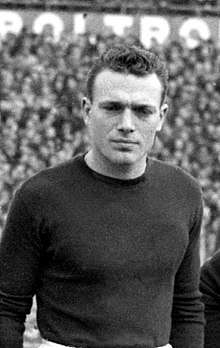Mario Rigamonti
Mario Rigamonti (Italian pronunciation: [ˈmaːrjo riɡaˈmonti]; 17 December 1922 – 4 May 1949) was an Italian football player, who played as a defender for Torino F.C. and the Italy national football team. He died in the Superga air disaster together with the whole Grande Torino team.[1]
 | |||
| Personal information | |||
|---|---|---|---|
| Date of birth | 17 December 1922[1] | ||
| Place of birth | Brescia, Kingdom of Italy | ||
| Date of death | 4 May 1949 (aged 26) | ||
| Place of death | Superga, Italy | ||
| Height | 1.82 m (6 ft 0 in) | ||
| Playing position(s) |
Defender Defensive midfielder | ||
| Youth career | |||
| 19??–1941 | Brescia | ||
| 1941–1943 | Torino | ||
| Senior career* | |||
| Years | Team | Apps | (Gls) |
| 1944 | → Brescia | 13 | (4) |
| 1945 | → Lecco | (?) | (?) |
| 1945–1949 | Torino | 140 | (1) |
| Total | 153+ | (5+) | |
| National team | |||
| 1947–1949 | Italy | 3 | (0) |
| * Senior club appearances and goals counted for the domestic league only | |||
Biography
Rigamonti was born in Brescia. Following his death in 1949, the Stadio Mario Rigamonti in Brescia, used by local club Brescia Calcio, was opened in 1959, and was dedicated to him in his honour.[1][2]
Club career
Rigamonti played as a defender, beginning his career in the youth system of his hometown club Brescia Calcio, later making his professional debut for the club in 1944. He was acquired by Torino F.C. in the summer 1941, aged 19, but played for the club's first team only after World War II.[1]
With Torino, Rigamonti made his Serie A debut in a 2–1 away loss to cross-city rivals Juventus on 14 October 1945; in total, he played 140 times for Torino and won four consecutive Serie A scudetti titles with the club.[1]
International career
Rigamonti was also capped three times for the Italy national football team between 1947 and 1949.[3] He made his international debut in a 3–2 win over Hungary on 11 May 1947.[1]
Death
Rigamonti died with most of the Grande Torino team in the Superga air disaster near Turin, on 4 May 1949.[1]
Style of play
Rigamonti was a tall, agile, physically strong, consistent and tenacious player, who was known for his skill and acrobatic ability in the air, as well as his fighting spirit and competitive style of play. A versatile player, he was capable of playing both in defence and in midfield.[1]
Honours
References
- "Rigamonti, Mario" (in Italian). Enciclopedia del Calcio. Retrieved 30 May 2015.
- "Stadio Mario Rigamonti". Retrieved 30 May 2015.
- "Nazionale in cifre: Rigamonti, Mario" (in Italian). FIGC. Retrieved 30 May 2015.